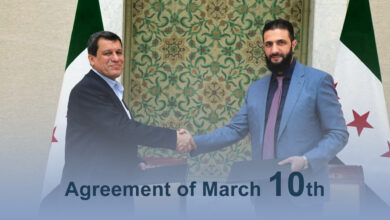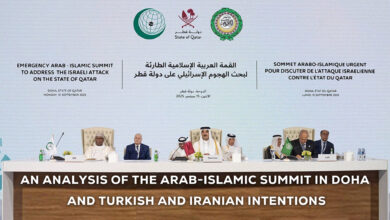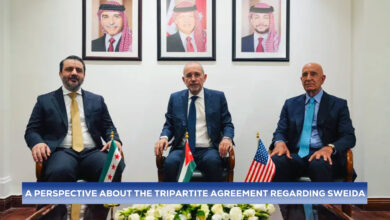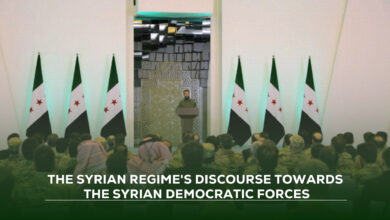The Future of Syria Amid Internal, Regional, and International Tensions
Abdulrazzaq Ali
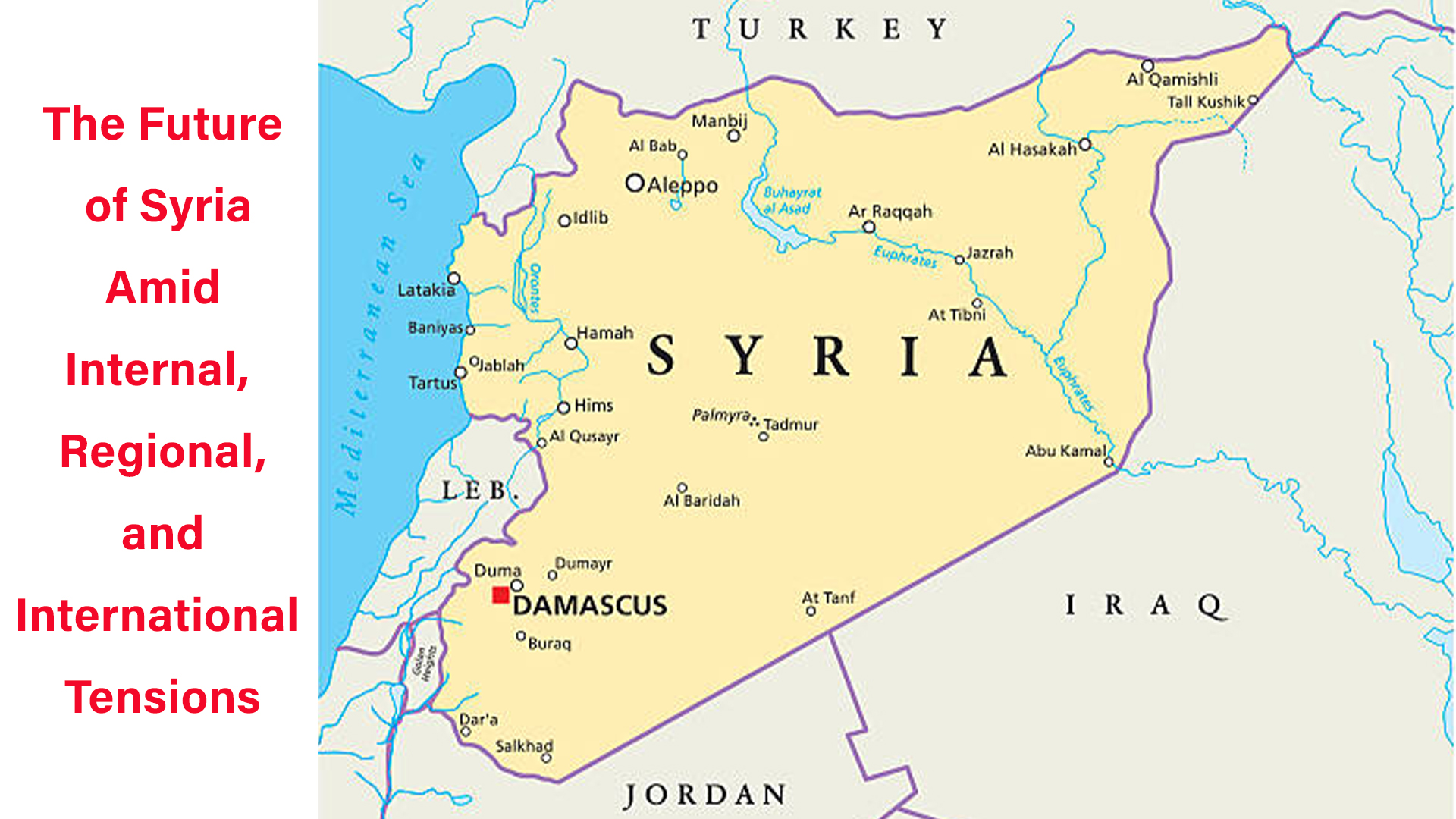
Following the heavy sacrifices made in the fight against the terrorist organization, it was ultimately defeated geographically in its last stronghold of Baghuz—thanks to the bloodshed of all the region’s social components. With the dramatic fall of the authoritarian regime, the expulsion of Iranian militias, the devastation of life in Gaza caused by an uncalculated and unresolved war adventure initiated by Iran, the crushing of Hezbollah and the destruction of its strongholds to sever Iran’s arm in favor of Lebanese sovereignty, and the collapse of the so-called “Axis of Resistance”—the path was paved for extremist Islamic groups, led by Abu Muhammad al-Joulani, to assume leadership in Syria. This may have occurred through a coordinated deal involving Israel, the UK, the US, and Russia, whereby Joulani would rebrand himself as “Ahmad al-Sharaa” and ascend to the presidency of the Syrian Arab Republic.
Now, as the saying goes, “the snow has melted, and the field has appeared,” and the threads of this complex game are beginning to unravel. Among the emerging truths is that Ahmad al-Sharaa is performing a scripted role, carefully prearranged. To execute this role effectively, obstacles had to be cleared—starting with the removal of the $10 million bounty for his capture or for information about him. This essentially granted him freedom, transforming him from a terrorist to a democrat. He was dressed in a sharp suit and tie, given a polished, civilized image, and was portrayed as someone capable of sitting with President Trump—who allegedly complimented his looks in the presence of the Saudi Crown Prince, who applauded the lifting of sanctions on Syria. If this isn’t a surreal political theater, what is?
What followed was a series of exemptions designed to revitalize Syria’s economy and restore it to life. European delegations arrived one after another, each in pursuit of their own interests. Gulf money poured in, and regional and international companies were granted open access to rehabilitate the war-torn country and re-float the regime after more than a decade of destruction.
All this, while seemingly forgetting—or willfully ignoring—the true nature of these extremist groups. Is this not a bizarre and extraordinary paradox? Indeed, it’s the language of interests.
This approach was adopted while crimes committed in the Syrian coastal regions and in Druze areas were overlooked, as were the daily killings, abductions, and atrocities occurring across the country.
What conclusions can we draw from this?
We can infer that those who brought Ahmad al-Sharaa to power are now responsible for protecting him, and he complies fully and unhesitatingly with all that is asked of him. Some examples include:
- His full readiness to sign the Abraham Accords and normalize relations with Israel.
- His efforts to allay Israel’s fears regarding the extremist groups under his umbrella, portraying himself as capable of managing these groups wisely.
- The expulsion of Palestinian jihadist factions.
- Guarantees of citizenship rights.
- A modern constitution that secures the rights of all components.
- The unity and integrity of Syrian territory.
These points align with the vision of the United States, Europe, and the Arab world.
Thus, al-Sharaa promotes himself domestically, regionally, and internationally. However, the internal situation paints a completely different picture:
First: The so-called “national dialogue” he convened reflects exclusion rather than inclusion.
Second: The constitutional declaration he issued is exclusionary.
Third: His election by extremist factions as president of the transitional phase undermines his democratic credentials.
These actions contradict his stated claims and raise serious concerns among other social groups—Kurds, Druze, Alawites, Christians, and secular Sunnis.
In light of these contradictions in both form and substance, we must ask several pressing questions:
- Is Ahmad al-Sharaa capable of managing Syria’s internal affairs with a spirit of democracy?
- Is he genuinely committed to translating his words into actions—particularly in guaranteeing the rights of all components in the new constitution?
- Is he open to recognizing the constitutional uniqueness of communities like the Kurds and the Druze?
- Will he prioritize national interests and prevent foreign interference?
We believe the al-Sharaa government will be unable to answer these critical questions—due to several internal, regional, and international factors, which we will outline below:
On the internal level:
- The groups managing the country are extremist Islamist factions with an agenda rooted in vengeance and bloodshed, as witnessed in Latakia, Sahnaya, Jaramana, Homs, Hama, and currently in Suwayda—the heartland of the Druze community. These groups are fundamentally opposed to pluralism, democracy, and inclusion.
- These factions are neither cohesive nor harmonized with the political leadership. They are ideologically monochromatic and Salafi-jihadist in nature.
- The political leadership has failed to engage in democratic dialogue, particularly with the Kurdish population.
- Its insistence on centralization reinforces autocracy—a model the Syrian people reject outright.
On the regional level:
The main regional players in the Syrian conflict include Turkey, Israel, and various Arab states—each with their own interests and agendas regarding the new government.
Turkey has moved swiftly to strengthen security and economic ties, hoping to benefit from economic investments. However, its primary goal remains the suppression of the Kurdish project—regardless of the cost.
Israel, meanwhile, plays a central role in Syria. It seeks to appeal to Kurdish sentiment, though the Kurds are too politically aware to be misled. They pursue their own third path and remain mindful of Israel’s historically antagonistic stance on Kurdish rights—from arming Turkey with advanced weaponry to its covert role in the arrest of Abdullah Öcalan, and now through its rivalry with Turkey in Syria. Israel’s only concern is its own security and strategic interests.
The Arab states, meanwhile, follow American strategies. Their goal is to pull Shar’a away from Turkey’s orbit through financial support and various incentives. Normalization with Israel by the “new regime” would open the door for broader Arab normalization.
On the international level:
European countries are working hard to promote stability and security in Syria, primarily to facilitate the return of Syrian refugees who have become an economic burden on host countries. This would also enable European companies to invest in post-war reconstruction.
The U.S. remains the key player in shaping Middle East geopolitics, starting with Syria. Its strategic allies in this project include Israel, its NATO partner Turkey, and its most effective partner in the fight against ISIS—Syrian Democratic Forces (SDF)—in addition to its strong ties with the new Syrian government.
Each of these actors has a distinct place in the U.S. foreign policy priority list.
So the question arises: How will the U.S. balance its interests among these competing players?
As we know, when interests converge, principles often disappear, and the compass shifts toward self-interest. This prompts us to outline three likely scenarios for Syria’s future:
Scenario One:
If the interim government in Damascus continues its outright rejection of decentralization and federalism—with the apparent support of U.S. envoy Thomas Barak, who seems to act as a spokesperson for Turkey during ongoing negotiations—despite decentralization being a central demand of most Syrian communities and a key safeguard against authoritarianism and future conflict, then this insistence on centralization will only sow new seeds of chaos, resentment, sectarian tension, and possibly armed conflict. This is a fate the Syrian people deeply fear and do not want.
Scenario Two:
If international stakeholders—particularly the U.S., France, and other European nations—genuinely support the majority of Syrians, including Kurds, in securing their constitutional rights and steer Syria in the right direction, the country may finally enjoy peace, stability, development, and prosperity. Otherwise, Syria risks slipping back to square one—or worse, into the abyss.
Scenario Three:
Despite our reservations about the controversial statements made by the U.S. envoy—which sparked a media storm—they may, in fact, serve the Turkish agenda. However, we are firmly convinced that the (Abdi-Sharaa) agreement was brokered by both the U.S. and France. It is a balanced and foundational document that cannot be bypassed. Final resolution depends on normalization and official agreements, after which the Syrian file may be closed in a way that satisfies all components—including recognition of Kurdish political rights.
Ultimately, there can be no solution without democracy. This third scenario is the most realistic and likely to unfold in the coming period.
